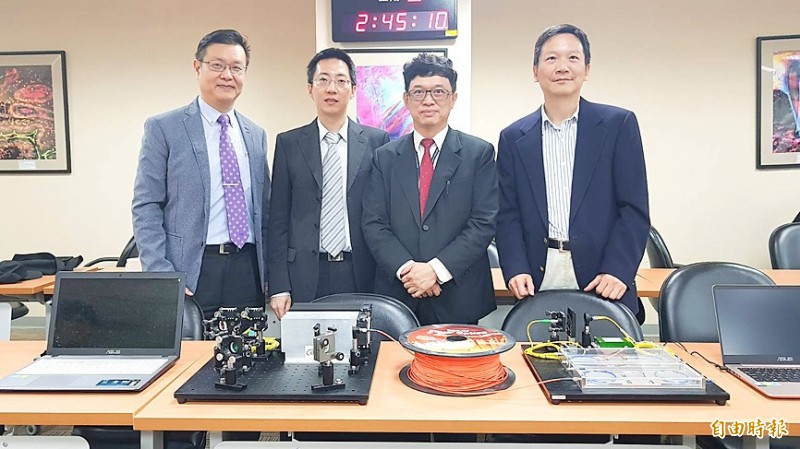《TAIPEI TIMES》Researchers unveil quantum cryptographic method

National Tsing Hua University Department of Physics associate professor Chuu Chih-sung, second left, and his research team pose for a photograph at a news conference in Taipei yesterday. Photo: Chien Hui-ju, Taipei Times
HARD TO HACK: The technique, which encodes binary code on photons, is harder to decrypt than contemporary cryptography, which can be cracked by supercomputers
By Lin Chia-nan / Staff reporter
A team of researchers at National Tsing Hua University (NTHU) yesterday unveiled a new cryptographic technique using quantum technology, saying that they have used it to transmit an encrypted message outside of a laboratory setting.
The team in September sent encryption keys from their university to a recipient at National Chiao Tung University via a 4km fiber-optic cable, NTHU department of physics associate professor Chuu Chih-sung (褚志崧) told a news conference at the Ministry of Science and Technology in Taipei.
The researchers used pulsed laser light to produce photons — the smallest measurable unit of light — on which they encoded binary code, he said.
The technique, which is based on a theory of differential phase shift quantum key distribution introduced by Stanford University researchers in 2002, frustrates any hacker’s attempt to steal the code, Chuu said.
As the system tolerates an error rate of up to 2.5 percent when there is no “eavesdropper” trying to steal the code, it can detect any theft attempt as the error rate would exceed 2.5 percent, he said.
While the US, China and other countries have conducted similar experiments at various distances, the NTHU team is the first in Taiwan to transmit encrypted keys using quantum communication in a real-world environment, Chuu said.
The team next plans to experiment using the technique to transmit encrypted keys up to 10km to the Industrial Technology Research Institute, he said.
Compared with contemporary cryptography, whose encrypted messages can be deciphered by supercomputers with “faster” computing capabilities, the quantum key distribution technique makes the formulas of keys more irregular, increasing the challenges for hackers, department distinguished professor Mou Chung-yu (牟中瑜) said.
The technique would be most applicable to the financial and national security sectors, Mou said.
As semiconductor manufacturing techniques have been pushed almost to their extremes, quantum computing, widely considered to be the next significant technological revolution, is one of the ministry’s priority areas when allocating funds, Deputy Minister of Science and Technology Shieh Dar-bin (謝達斌) said.
The ministry last year provided funding for NTHU to establish the Center for Quantum Technology and is glad to see that researchers have produced preliminary results, Shieh said, adding that he expects the team’s technique to be applied to communication at longer ranges.
新聞來源:TAIPEI TIMES




















